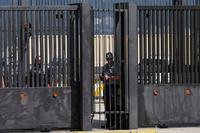President Joe Biden issued a new proclamation late last month pardoning Americans federally charged with simple possession, attempted possession and use of marijuana -- but none of it applies to service members.
A White House official confirmed to Military.com on Tuesday that Biden's Dec. 22, 2023, proclamation did not apply to offenses under the Uniform Code of Military Justice, the federal body of laws enacted by Congress that applies to active-duty military service members and some retirees accepting a pension.
Biden's latest proclamation follows his earlier pardon in October 2022 of Americans federally charged with simple possession of marijuana, which covered nearly 6,500 people. No one was freed from federal prison due to the 2022 or 2023 measures, and the vast majority of charges and punishments related to marijuana are enforced at the state level.
Removing a federal marijuana conviction for a civilian lifts barriers to finding steady work, reliable housing and clearing one's record. For service members who faced a UCMJ punishment related to marijuana, removing such a conviction could change their discharge status and make them eligible for certain benefits.
While the president does have the unilateral right to alter certain punishments under the Manual for Courts-Martial, a major change to the Uniform Code of Military Justice would have to be made by Congress. A marijuana possession charge carries a potential penalty of dishonorable discharge, forfeiture of pay and a two-year maximum punishment, according to the Manual for Courts-Martial. The punishment is often far less in practice.
Eric Carpenter, an associate professor of law at Florida International University who specializes in military justice, told Military.com in 2022 that the UCMJ applies to service members first, before federal or state laws are applied.
Speaking with Military.com again on Tuesday, he added that he didn't expect Biden's second pardon measure to apply to the military.
"This was not surprising," Carpenter said. "He left out service members when he did something similar in 2022. Drug use in the military is more serious than recreational, civilian drug use because it impacts good order and discipline."
While the president's pardon may not help service members or retirees charged under the UCMJ, it could help broaden the pool of Americans who could now qualify for military service as many of the branches face the toughest recruiting environment in decades and start testing out their own policy changes that could offer leniency for prior drug users to join.
Military.com reported in 2022 that a study from the Pentagon showed that 77% of young Americans would not qualify for military service. Drug and alcohol abuse accounted for 8% of potential recruits between the ages of 17-24 being dismissed from joining the ranks.
Findings from a 2023 Gallup poll showed that seven in 10 Americans think marijuana use should be legal, which was the highest level yet, the polling company said.
The majority of states have legalized marijuana for medical use, recreational use or both. Only 10 states currently do not allow marijuana use in any form: Indiana, Wisconsin, Tennessee, North Carolina, South Carolina, Idaho, Wyoming, Nebraska, Kansas and Texas, according to MJBizDaily, a trade publication that follows the industry.
While marijuana and other THC-related products may be legal in many states, they are still illegal at the federal level and, therefore, outlawed for service members under the UCMJ.
But some military branches have been workshopping policies that would give drug users a second chance at joining the ranks.
In October, the Air Force's first year of a new THC pilot program -- which would allow some applicants who drug-tested positive for the active compound in marijuana, a chance to retest and possibly enlist -- was more popular than the service expected.
The Air Force anticipated only 50 cases annually when it announced that pilot program. Military.com reported in 2023 that the service encountered triple that number, granting 165 waivers after candidates retested and were shown to be free of THC.
Related: Biden's Marijuana Pardons Don't Apply to Service Members












